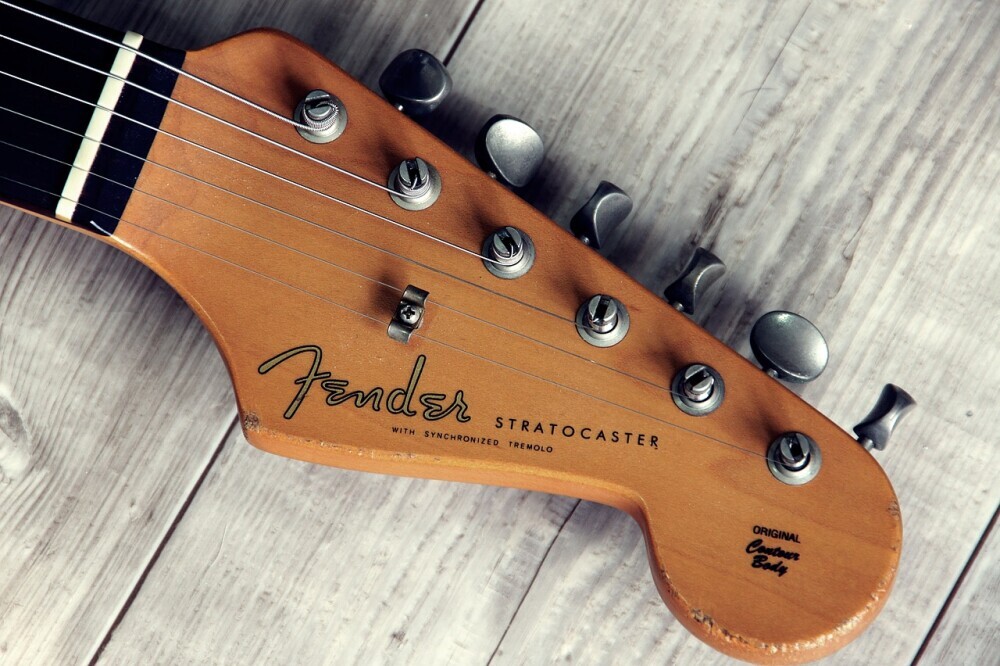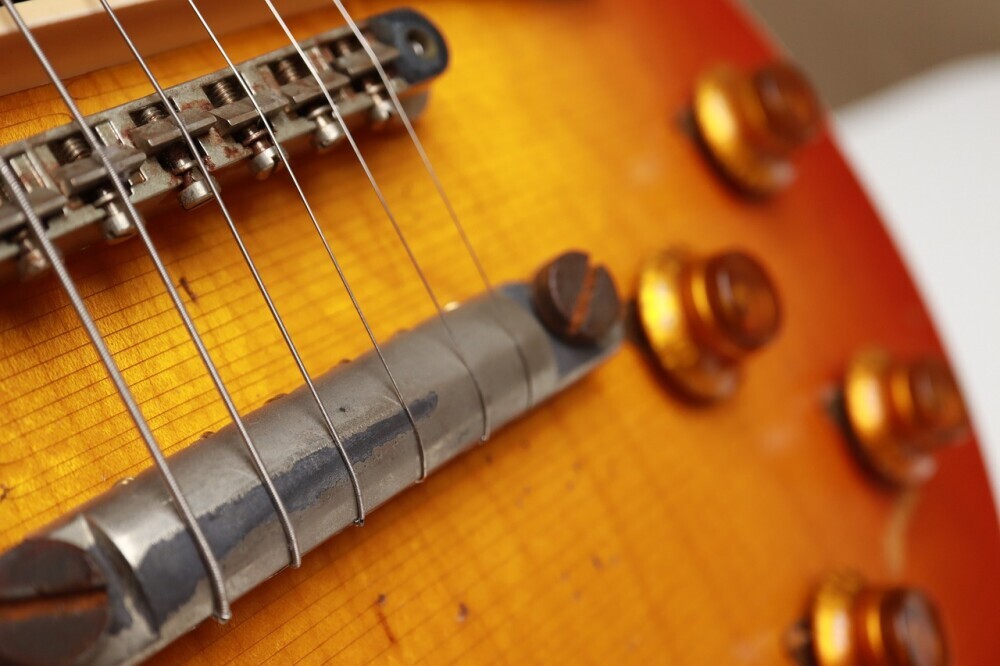Fender and Gibson, two giants in the world of guitars, each carry a fascinating history that has shaped the music industry as we know it. It all started with their founders, Leo Fender and Orville Gibson, who were visionaries in crafting musical instruments that broke the norm of their times.

Leo Fender began with a simple idea: an easy-to-play guitar that could amplify the player’s sound without compromising clarity. His Stratocaster and Telecaster designs became synonymous with rock ‘n’ roll, inspiring countless musicians to express themselves like never before.
Orville Gibson, on the other hand, aimed to enhance the acoustic guitar’s natural volume and tone. His innovations led to the creation of the Les Paul model, a guitar that’s become a cornerstone in jazz and blues music. Both brands brought something unique to the table, influencing entire genres with their distinct sound profiles.
It’s hard to talk about Fender and Gibson without mentioning some of their iconic models. The Fender Stratocaster and Telecaster and the Gibson Les Paul and SG are not just instruments; they’re legends. Each of these guitars has adorned the stage with some of the greatest musicians, from Jimi Hendrix to Slash.
Both companies didn’t just manufacture guitars; they crafted tools for artists to revolutionize music. Fender’s contribution to the electrified sound of rock and blues is irreplaceable. Similarly, Gibson’s embrace of rich, warm tones and sleek design has led to its staple presence in countless hit records.
Their legacies aren’t limited to just instruments. Fender and Gibson’s stories highlight the evolution of music styles and even broader youth culture. The way these brands have adapted over the decades continues to inspire new artists, proving that innovation, when intertwined with tradition, can create something truly magical.
Comparing Build and Design: Craftsmanship at Its Best
When it comes to the craftsmanship of Fender and Gibson guitars, it’s like comparing two distinct art forms. Each brand has a signature style that speaks volumes about their attention to detail and commitment to quality.
Fender’s approach to design tends to be more minimalist, focusing on functionality without sacrificing style. Their bolt-on necks and contoured bodies offer a sleek, modern look that players love. These features not only enhance playability but also add to the guitar’s durability, making it perfect for both stage performances and long recording sessions.
Gibson, on the other hand, often opts for set necks and heavier, solid bodies that seem to echo richness in both sound and aesthetics. The carved tops and intricate inlays are iconic, providing a classic vibe that appeals to traditionalists and modern players alike.

Let’s talk wood. Fender typically uses ash or alder for their bodies, materials known for producing a bright and vibrant tone. This makes a Fender guitar ideal for genres that thrive on clarity and twang, like country or pop-rock.
Gibson’s choice often leans towards mahogany, paired with a maple top. This combination offers a deeper, more resonant sound that suits blues, jazz, and heavy rock. It’s the perfect fit for anyone looking to create those lush, full-bodied tones.
A deep dive into neck styles reveals further contrasts. Fender prefers a longer scale length, which contributes to their guitars’ bell-like tones and snappy response. Gibson’s shorter scale necks offer a smoother, warmer sound and easier playability for bends and solos.
Finally, there’s the finishing touch. Fender’s vibrant color schemes and glossy finishes are iconic, while Gibson’s sunburst and vintage hues carry an undeniable charm. These aesthetic details might seem minor, but they greatly influence a player’s connection with their instrument.
Choosing between these two boils down to personal preference—whether you want the clean elegance of a Fender or the timeless elegance of a Gibson, there’s no wrong choice. Both brands deliver craftsmanship that stands out in a crowded field of incredible instruments.
Sound and Performance: The Ultimate Showdown
When it comes to sound and performance, Fender and Gibson are like two different characters in a music drama, each playing their part perfectly. It’s all about what vibe you’re after and how their distinct tonal qualities can fit into your musical tapestry.
A Fender guitar often brings a lively brightness to the forefront. The signature twang is unmistakable, putting a spotlight on those plucky highs that have become a staple in rock, country, and surf music. Need that crisp chime for a jangly riff or a clean-cut solo? Fender stands ready to deliver.
Gibson’s sound steps in with a warm and rich embrace. Known for smoother output, it excels in providing that thick, sustaining tone that singers, songwriters, and shredders alike crave. The humbuckers used in most Gibsons are pivotal in minimizing interference, giving a lush mid-range that’s perfect for styles like jazz, blues, and hard rock.
The brand’s impact in different music genres isn’t just about tone—it’s about how musicians have harnessed these traits to craft something unique. Fender is often seen in the hands of artists looking to project sharp riffs and articulate solos. Think of rock legends like Eric Clapton or newer indie bands who thrive on that signature clarity.
Meanwhile, Gibson has adorned the shoulders of many a rock god. Its roaring roar with fulsome undertones defined the sound of legends from Jimmy Page to modern icons like Slash. It’s a favorite choice for those yearning for a thick tone that sustains beautifully over time.
Musicians often debate about which brand suits a particular genre, but really, it’s about how you vibe with the instrument. Either can be adapted to any style, depending on the player’s intent.
Amplification and gear also play a significant role in performance. Fender guitars often mesh well with reverb-laden amps that further enhance their shimmering highs. Meanwhile, Gibsons can benefit from more gain and lower tones, easily complementing high-gain amps for that extra punch.
In the end, whether you’re seeking Fender’s crispness or Gibson’s smoky smoothness, each offers a world of possibilities. Understanding this helps in refining your musical expression and identifying which brand best aligns with your sound vision.
Price, Value, and User Experience
Evaluating the price tag on a Fender or Gibson guitar goes beyond just cost—it’s about understanding the value they offer in return. Whether you’re a budding guitarist or a seasoned player, how these brands fit into your budget and expectations is crucial.
Fender generally offers a wide range of guitars that can cater to both entry-level and experienced players. Models like the Squier series provide a great starting point for beginners, combining affordability with Fender’s iconic sound. These options allow newcomers to explore without a hefty investment while also enjoying quality craftsmanship.
On the flip side, Gibson guitars often lean towards the premium market, which can lead to that initial sticker shock. However, there’s a reason many musicians see them as a worthy investment. The craftsmanship and attention to tonal detail mean that a Gibson isn’t just a purchase—it’s an investment in your musical journey.
Considering the resale value, Gibson often has the edge. Classic models can retain their value incredibly well over time, sometimes even appreciating. For collectors or those looking to potentially sell their gear down the line, this makes Gibson a strong contender.
Fender, with its broader catalogue at various price points, might not boast the same resale factor across all models, but its widespread admiration ensures a steady market. Plus, certain vintage Fenders can indeed become prized possessions.
User reviews and player satisfaction tend to highlight Fender’s playability and tonal flexibility as big positives. It’s a brand that fits naturally across many styles, making it a beloved choice for versatility seekers.
Gibson, meanwhile, garners praise for its robust sound and solid build quality. For players who seek a guitar with a strong cultural legacy and potent performance, it’s hard to go wrong with a Gibson.
Ultimately, picking between Fender and Gibson hinges on your style, musical needs, and, of course, budget. Whether you’re after the iconic sounds of Fender or the timeless resonance of Gibson, your perfect guitar is less about brand rivalry and more about what makes you feel at home when you hold it.
